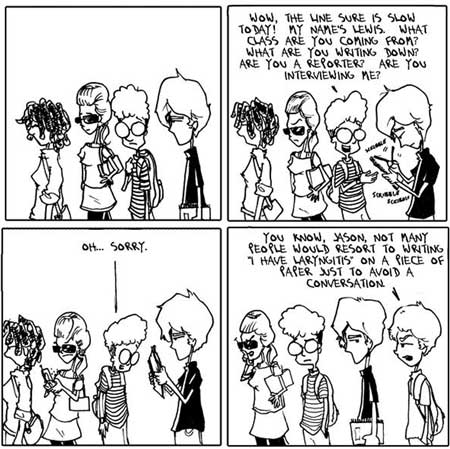We’re in the midst of a bullshitting epidemic. I’m not sure when it first infected academia – if it’s always been a key component, or if it’s a recent development – but now it seems almost impossible to find a humanities discipline where every paper (read: most papers) you write are sincere. For a while, I thought it was only within my specific major, philosophy, that pulling through half-hearted arguments and critiques one doesn’t really believe in was prevalent. The more I talk to people, though, the more it appears that coming up with a nonsensical criticism of something is the most important skill to master in order to get through college, whether you’re interpreting the meaning of artwork or writing about rhetorical strategy in literature.
In gender studies classes, we passionately argue that the word “women” should be written as “womyn” because including the word “men” within the word “women” somehow allows the English language to oppress females. I realize there are passionate defenses for focusing on changing the language that may or may not be important to our understanding of oppression and to our understanding of the world in general, but most of us developing these harsh critiques of the language don’t really believe any of what we’re saying. Let’s be honest. Most of what we write is just an argument that we can talk about for a few pages and then never think about again.
The problem isn’t just limited to gender studies or even fields where we theorize. In poetry class, we string together meanings from the numbers of syllables of different lines that are so obscure it seems almost impossible that the author could have really meant for the syllable count to have such an interpretation. We also often don’t believe the interpretation is accurate – but hey, we can argue for it.
We’re rewarded for our creativity in challenging issues in unusual ways, and we’re taught that we must find the creative angle, the view outside the box. It turns out that generally a practical analysis or any mainstream argument is insufficient because it’s been made before. The result is that we search for a new framework from which to consider a well-worn subject until we find our own original way of looking at something. While fresh ways to consider classic theories or works are important contributions to a discipline, it’s impossible to constantly find them. Despite the fact that it’s going to be impossible to always find a solid new paradigm, we need so badly to see something in a new light that we’ll be excited to knowingly hallucinate if we think it will give us a different vision. We prefer to take creative stances we don’t actually believe over traditional stances that do actually make sense to us.
So the next question is what we should think about the necessity to bullshit. On the one hand, it’s an important life skill. Crafting philosophical-sounding reasons why something ought to be done or accepted is important to being successful. On the other hand, the reason that’s important and the reason it works is that we’ve all been so eloquently trained in the art. If tomorrow’s leaders didn’t spend four years of their lives being rewarded for impractical but idealistic-sounding language, then maybe our culture wouldn’t be so infused with politicians and policymakers who make a living rallying us behind empty symbolic “causes” like banning flag-burning while the mainstream, difficult issues never receive serious discussion.
I’m not exactly saying our professors are directly responsible for the failure to solve the social security crisis, but there should be some sort of shift in education that asks us to think about issues practically. It would be beneficial in training people to think about solving actual problems. But then again, who really cares about ensuing poverty when we could spend our time learning to spell words differently?
Jill is a sophomore in Arts & Sciences and a Forum Editor. She can be reached via e-mail at [email protected].
 Matt Rubin
Matt Rubin Matt Rubin
Matt Rubin Matt Rubin
Matt Rubin